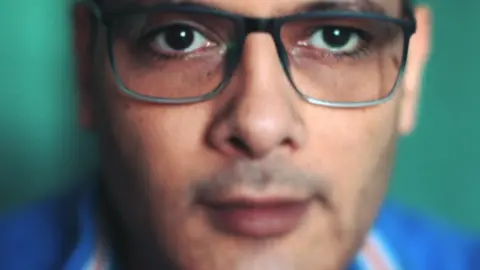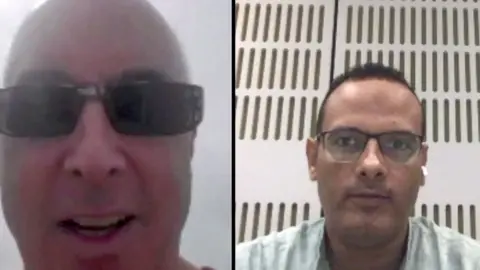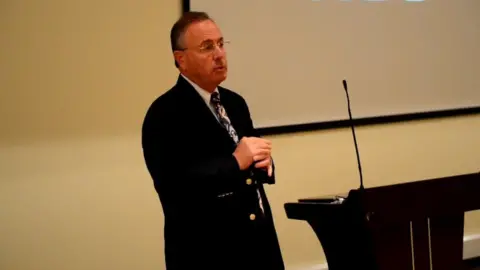Doctors around the world are offering false hope and bogus treatments to millions of people with an incurable condition that can lead to blindness. BBC reporter Ramadan Younes, who has the disease himself, went undercover to expose them.
Lying in hospital for five days in complete darkness, bandages covering my eyes, I imagined what my life would be like with my vision improved.
It was 2013, and I had travelled to Beijing, China, after reading about a treatment for the genetic eye disease retinitis pigmentosa (RP). Six years earlier, I had been diagnosed with the condition, which means I'm gradually losing my vision and one day I could go blind.
I raised $13,000 (£10,900) to pay for treatment that I was told could make my eyesight better and stop it deteriorating further. I was told it would change my life.
When I returned to my home in Cairo, Egypt, I told friends and family that my sight was improving - but it wasn't true. Nothing had changed.
Month after month, I still feel my vision fading away. The condition means the millions of light sensitive cells at the back of my eye are gradually dying.
There is currently no cure - just one approved genetic therapy that can stop the disease progressing, but only for some patients with a specific faulty gene. But it hasn't stopped doctors around the world from claiming they can treat the untreatable, often at huge expense.

In three years of investigating supposed treatments for RP, I spoke to dozens of patients like me who had been given false hope, and I met many doctors claiming to have miraculous therapies - in places as varied as Miami, USA, Russia and Gaza.
In Gaza I met people living in refugee camps who had gathered thousands of dollars from friends and family to be treated with injections of glucose and vitamins, along with vibrating massage devices.
I met patients in Sudan who were urged by doctors to travel to Russia every year and spend thousands of dollars on vitamin injections - which even a member of staff at the hospital admitted to me over the phone could not possibly work.
But the case of Miami's Dr Jeffrey Weiss - who says in his promotional videos, "I am treating the untreatable. I am treating people who have never had hope" - was the most disturbing, taking place in one of the most highly regulated healthcare systems in the world.
The treatment is actually a clinical trial run by Dr Weiss, who performs the operation, and his colleague Dr Steven Levy, who is chair of the study and who has the initial discussions with patients.
But unlike most trials in the US, which are funded by the government or private drug and medical device companies, in this case patients have to pay $20,000 (£16,750) to take part.
One leading doctor - president of the American Society of Retina Specialists, Dr Judy Kim - told the BBC charging for a clinical trial went against widely accepted ethical guidelines and was "morally reprehensible".
I called Dr Levy, posing as a patient and secretly recording him, to see what he tells patients about the trial. He told me that it involved taking stem cells from the patient's bone marrow and then injecting them under the eyelids and into the back of the eye sockets.

He told me that Dr Weiss had treated about 700 patients with "no complications", and "the vast majority" of patients experienced benefits.
But former patients told me a different story. One, named Ahmed Farouki, said that after the procedure he found he could no longer see with his left eye.
Since then, Mr Farouki said he has been telling his story on social media and warning others not to have the treatment. He said if he could speak to Dr Weiss, he would tell him: "Stop sabotaging people's futures. Enough is enough."
Several other patients also told me they experienced complications after the procedure, including having debris in the eye.
All the patients I spoke to in the United States found the treatment the same way: through a government website called Clinicaltrials.gov.

Exposing the doctors selling bogus eye treatments
Watch on BBC iPlayer

It lists more than 400,000 trials and, in most cases, there is no way to tell what is regulated, and what is not.
A short disclaimer tells users that "listing a study on this site does not mean it's been evaluated by the US federal government".
So patients searching for a glimmer of hope are left with little guidance as to whether they are joining a valid trial or not.

I struggled to believe that a doctor could operate so openly unless there was some scientific evidence behind his claims. So I played recordings of my call with Dr Levy to three professors of ophthalmology.
Dr Byron Lam from the Bascom Palmer Eye Institute in Miami described Dr Levy's claims as "really crazy" and said he did not believe there was "any scientific validity" to the idea that injecting bone marrow stem cells would help the condition.
Responding to claims that there were "zero adverse events" from the procedure, Dr Thomas Albini - also from the Bascom Palmer Eye Institute - said it was "extremely difficult for me to believe".
"There are risks to anaesthesia, there are risks to the bone marrow biopsy and there are certainly risks to the eye procedure," he said.
Prof Robert MacLaren from the University of Oxford said: "This is not a valid clinical trial. This is a very worrying treatment that's potentially damaging for the patients and it needs to stop."
After I revealed to Dr Levy I was a journalist investigating this treatment and requested an interview with Dr Weiss, he wrote back and said I was a sham.
"Your self-serving desire for a tiny flicker of fame through harming our study, remains unbound.
"You are a disgrace to your family, and to millions of people suffering from untreatable eye disease from across the world.
"Best regards, Steven Levy, MD."
I wondered how all of this was possible in a highly regulated country such as the US, especially as there is evidence of concerns about the two doctors' methods.
In 2021, the American Academy of Ophthalmology permanently terminated the membership of Dr Weiss after investigating the way the trial was run.
It concluded that the study broke rules against giving "false, untrue, deceptive, or misleading information" to the public and creating "unjustified expectations of results". The academy also judged that it breached the rules with results that did not "substantiate the publicly made claims for safety and efficacy of the research".
Dr Levy had surrendered his licence to practise medicine in 2004 in Connecticut and New York. In New York, the state's Department of Health had charged him with 41 specifications of professional misconduct - including gross negligence, incompetence on more than one occasion, fraudulent practice and failing to comply with a federal law. Dr Levy did not contest the allegations.

But Andrew Yaffa, a medical malpractice lawyer, told me it was hard to stop the two doctors from offering their treatment in Florida.
Mr Yaffa said more than 15 patients had approached him with potential cases, but he said medical malpractice in the state is complex and expensive to pursue.
Because the patients' vision was already badly deteriorated by their illness, it would be hard to get sufficient damages awarded by a court to fund the expense of litigation, he said.
"Florida requires that your hired hand that you bring to your house to cut your lawn has more insurance than any physician that's going to operate on you," he said.
The US Food and Drug Administration regulates clinical trials and it seemed Dr Levy's conversation with me might have broken the rules on how they should be run. But Mr Yaffa said the agency was understaffed and the regulations needed more clarity.
The FDA did not respond to specific questions about Dr Levy and Dr Weiss.
But in a statement, the agency said companies making unsubstantiated claims about unproven cell therapies were doing "a disservice to those innovators who are working to develop safe and effective stem cell products".
The FDA added that unproven and unapproved stem cell therapies can be "particularly unsafe and have led to serious infections, blindness, and death".


Post a Comment